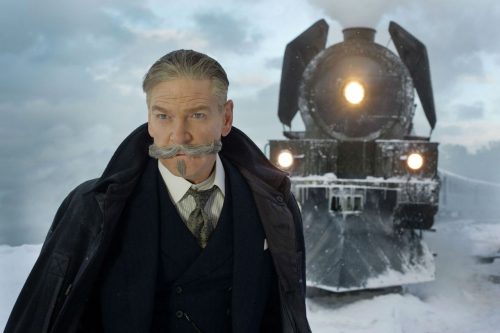Murder on the Orient Express: Off the Rails, by Rudie Obias
Kenneth Branagh hit it out of the park with his last film, Cinderella, for the Walt Disney Company. His approach to modernizing the classic animated film was very well-received, while staying true to its themes and characters worked wonders for Disney’s onslaught of live-action versions of animated films. In fact, Cinderella was such a big hit that Branagh decided to update another film classic, Murder on the Orient Express, with the director himself in the lead role of brilliant detective, Hercule Poirot. Unfortunately, Kenneth Branagh couldn’t keep this train on track.
Murder on the Orient Express begins with Poirot wrapping up a mystery in Jerusalem and looking forward to a much-needed break before his next investigation. While in Istanbul he receives a telegram about a job in London, as he runs into an old friend who offers to take the detective as far as France on his train, The Orient Express. On board the train, Poirot meets other passengers and Samuel Ratchett (Johnny Depp), an unpleasant American who asks for the detective’s protection after he receives cryptic and threatening letters. Poirot refuses and Ratchett is found murdered the next morning after the Orient Express is derailed due to an avalanche. The rest of the film is a pretty slow ride of non-clues and murder suspects that ends with a very unsatisfying conclusion.
At first, the film is pleasantly old fashioned. The opening sequence is charming and fun like an old time murder mystery with Hercule Poirot figuring out who stole an important religious artifact in a grand presentation in front of, what seems to be, the entire population of Jerusalem. Branagh does a great job capturing the early 30s with an epic scale. However, the movie loses track of that sense of adventure and mystery as soon as the actual murder mystery begins.
A majority of the film’s 114-minute running time is spent with red herrings and a dumb backstory that really halts any momentum and energy. It’s almost as if when the Orient Express comes to a screeching halt, the movie follows suit. Too much of the movie is spent with one-on-one interviews with suspects that this viewer felt completely boring and slow. A revelation of a backstory that is supposed to open up possible motives falls flat because it feels like it comes from nowhere and it’s only really there to make an audience feel something more for the suspects. And by the time it is introduced, you just don’t care anymore. I could actually feel the people around me starting to feel bored and uninterested.
However, what I will say is that the only real reason to watch Murder on the Orient Express is its presentation. Kenneth Branagh decided to film it in glorious 65mm and it’s gorgeous! It’s rare to watch a movie projected in that format, so if you must watch it, find a theater that’s screening it on actual film. But overall, Murder on the Orient Express should’ve been more engaging with a sense of urgency. It could’ve started an interesting franchise of Kenneth Branagh-directed Hercule Poirot mysteries but it’s doubtful there will be any more of these films. I admire Kenneth Branagh for trying to inject class into modern filmmaking with movies like Marvel’s Thor and Disney’s Cinderella, but sometimes it just goes off the rails.



























